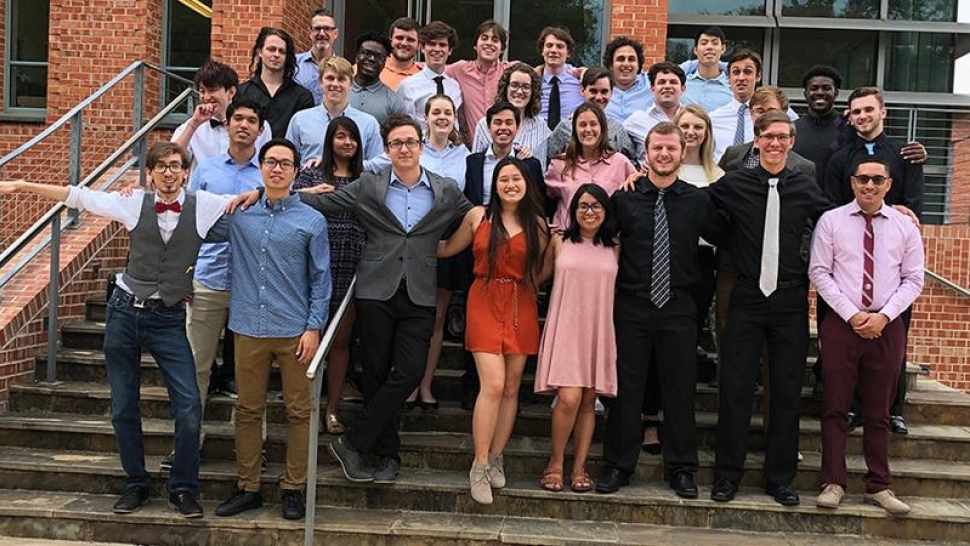
As part of a 14-year community partnership with Goodwill San Antonio, engineering science students at Trinity University created adaptive tool and equipment prototypes to help people with disabilities better perform their jobs. “Specification, design, building, and testing of these devices comprise the central focus of ENGR 2181 and 2182, a two-semester course sequence that engineering students typically take during their sophomore year,” says Jack Leifer, Ph.D., associate professor engineering science.
“Besides giving students the opportunity to take a project from a needs statement to a functioning prototype, one early goal of the course was to incorporate a service-learning aspect, where students would work directly with clients to fulfill a particular need. This is where the partnership with Goodwill San Antonio began,” says Leifer.
“The goal of the collaboration is to create adaptive tools and equipment to help people with disabilities and other barriers perform their jobs more safely, easily, and efficiently,” says Penny Benavidez, director of public relations for Goodwill San Antonio. “The focus of overcoming disabilities is critical, as 76 percent of Goodwill San Antonio’s Business Services team members have significant disabilities.”
Under the guidance of committed Trinity professors, dedicated and socially-conscious sophomore engineering science students annually partner with Goodwill San Antonio in support of the agency’s mission to help change lives through the power of work. Each academic year for the last 14 years, students have met with Goodwill leadership to identify operational challenges faced by employees with disabilities. The students then design and develop adaptive equipment to help those individuals perform their jobs more efficiently. Once the designs have been presented, Goodwill decides at a later date which projects are feasible for use in the field.
The student groups presented prototypes of their designs with these goals in mind to their engineering science professors and to Goodwill San Antonio staff. This year, two projects were designed with visually impaired persons in mind. Projects presented included:
Pivot Knife (designed with visually impaired persons in mind)
Fine motor skills are required for most activities in the kitchen including measuring, operating appliances, and cutting. When cooking, it is important to be able to cut ingredients into even pieces. This skill is harder to attain for those with impaired vision and can lead to potential accidents from sharp knives. A knife connected to a cutting board, known as a pivot knife, can provide aid to those who experience difficulty cutting, but is lacking in many areas. The goal for this project was to improve the pivot knife design to provide more aid, efficiency, and safety.
Sorting Rig - aka "The Octopus" (Goodwill San Antonio)
An “octopus” is the name given to a large series of connected sorting racks that allow Goodwill personnel—including those who are mobility-limited—to quickly and efficiently process and sort through a wide variety of donated apparel. The current octopus is too large for most facilities and was, therefore, adapted to fit the smaller size constraints while still providing a safe, efficient, and intuitive method of sorting clothes. The goal was to redesign the current octopus to fit within the 15-foot horizontal space available without compromising the ability to accommodate other equipment already existing at the location.
Ironing Board (designed with visually impaired persons in mind)
Ironing clothes presents challenges for visually impaired people because it compromises their safety and efficiency. The heat emitted from the iron can burn the user, and the iron’s cord can trip the user. Therefore, it was necessary to develop a procedure for them to independently and safely un-wrinkle clothes while completing the task within a reasonable time-frame.
Chainsaw Kickback (Goodwill San Antonio)
Chainsaw users should be safe from kickback regardless of their physical capabilities. However, users operating a chainsaw with one arm are at higher risk of experiencing severe physical injuries from kickback due to many chain brake designs relying on two-armed operation. This project incorporated a pneumatic cylinder that passively activates only when kickback occurs.
Trigger Finger Glove (Goodwill San Antonio)
Individuals with limited tactile ability have a difficult time applying stickers to merchandise while wearing gloves; the objective was to design a solution that allows easier application of stickers to merchandise while also providing protection for the user’s hands.